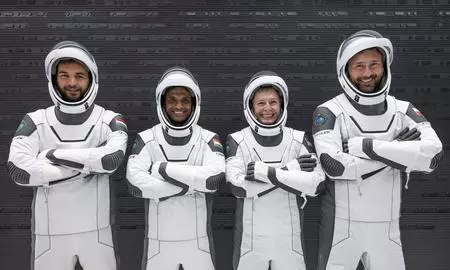
Axion 04 mission delayed again after leak in propulsion bay
text_fieldsThe launch of the Axion 04 mission, which was scheduled for Wednesday, has been postponed yet again after a leak was discovered in the propulsion bay during a pre-launch test, the Indian Space Research Organisation (ISRO) announced.
The mission, operated by US-based Axiom Space, is significant as it will carry Group Captain Shubhanshu Shukla, the first Indian astronaut to travel to the International Space Station (ISS), along with three international crew members. They were set to lift off aboard a SpaceX Falcon 9 rocket from the Kennedy Space Centre in Florida at 8 a.m. local time (5:30 p.m. IST) on June 11.
The launch has already been delayed several times, first from May 29 to June 8, then to June 10 and June 11.
ISRO Chairman Dr. V. Narayanan confirmed the postponement on the social media platform X, saying, “Postponement of Axiom 04 mission slated for launch on 11th June 2025 for sending first Indian Gaganyatri to ISS. As part of launch vehicle preparation to validate the performance of booster stage of Falcon 9 launch vehicle, seven second of hot test was carried out on the launch pad. It is understood that LOX leakage was detected in the propulsion bay during the test.”
Following discussions between ISRO, Axiom, and SpaceX experts, the agencies decided to repair the leak and conduct additional validation tests before approving a new launch date.
SpaceX also posted a statement on X, saying, “Standing down from tomorrow’s (June 11) Falcon 9 launch of Ax-4 to the ISS to allow additional time for SpaceX teams to repair the LOx leak identified during post static fire booster inspections. Once complete — and pending Range availability — we will share a new launch date.”
Group Captain Shukla will serve as the mission’s pilot, flying alongside Commander Peggy Whitson from the United States. Mission specialists Slawosz Uznanski-Wisniewski from Poland and Tibor Kapu from Hungary round out the crew.
Upon reaching the ISS, Shukla will conduct pioneering experiments on food and nutrition under a joint scientific programme led by ISRO and the Department of Biotechnology (DBT), with support from NASA. The research will explore the potential of microalgae as a sustainable space food source, studying how microgravity and space radiation affect its growth and biological functions.
This marks a historic moment for India, as Shukla will become the second Indian to travel to space after Rakesh Sharma’s 1984 mission and the first to set foot on the ISS.












